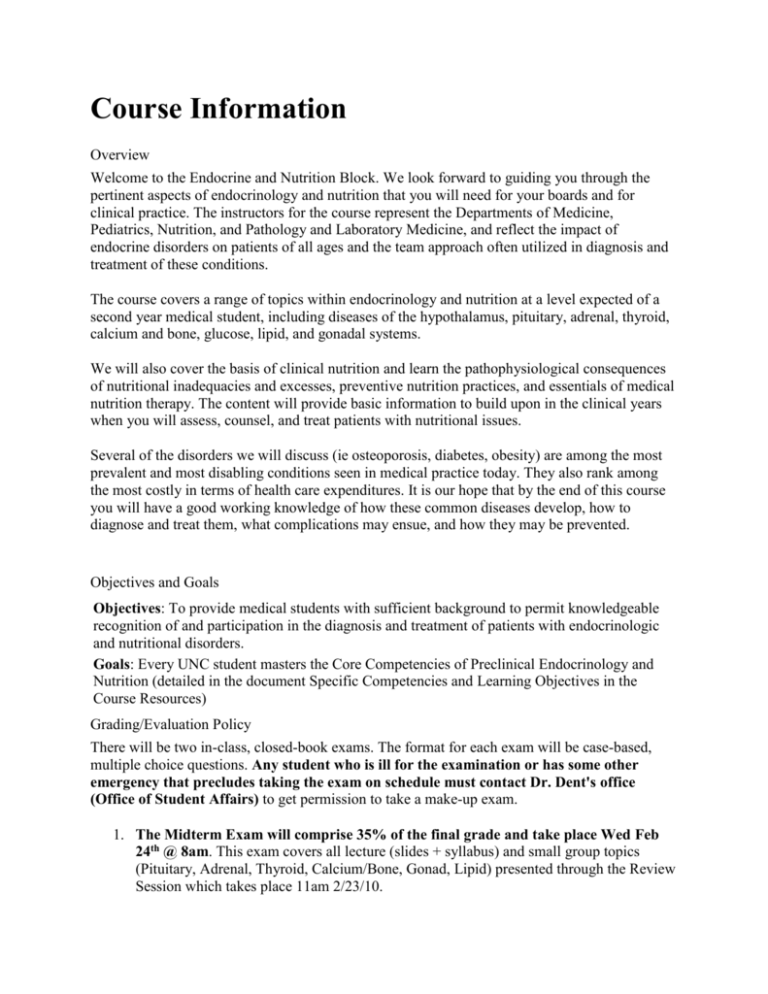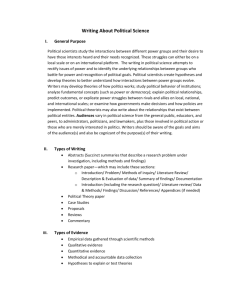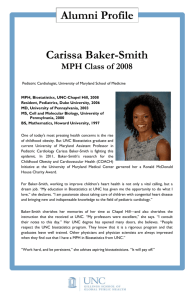Endocrine System & Nutrition
advertisement

Course Information Overview Welcome to the Endocrine and Nutrition Block. We look forward to guiding you through the pertinent aspects of endocrinology and nutrition that you will need for your boards and for clinical practice. The instructors for the course represent the Departments of Medicine, Pediatrics, Nutrition, and Pathology and Laboratory Medicine, and reflect the impact of endocrine disorders on patients of all ages and the team approach often utilized in diagnosis and treatment of these conditions. The course covers a range of topics within endocrinology and nutrition at a level expected of a second year medical student, including diseases of the hypothalamus, pituitary, adrenal, thyroid, calcium and bone, glucose, lipid, and gonadal systems. We will also cover the basis of clinical nutrition and learn the pathophysiological consequences of nutritional inadequacies and excesses, preventive nutrition practices, and essentials of medical nutrition therapy. The content will provide basic information to build upon in the clinical years when you will assess, counsel, and treat patients with nutritional issues. Several of the disorders we will discuss (ie osteoporosis, diabetes, obesity) are among the most prevalent and most disabling conditions seen in medical practice today. They also rank among the most costly in terms of health care expenditures. It is our hope that by the end of this course you will have a good working knowledge of how these common diseases develop, how to diagnose and treat them, what complications may ensue, and how they may be prevented. Objectives and Goals Objectives: To provide medical students with sufficient background to permit knowledgeable recognition of and participation in the diagnosis and treatment of patients with endocrinologic and nutritional disorders. Goals: Every UNC student masters the Core Competencies of Preclinical Endocrinology and Nutrition (detailed in the document Specific Competencies and Learning Objectives in the Course Resources) Grading/Evaluation Policy There will be two in-class, closed-book exams. The format for each exam will be case-based, multiple choice questions. Any student who is ill for the examination or has some other emergency that precludes taking the exam on schedule must contact Dr. Dent's office (Office of Student Affairs) to get permission to take a make-up exam. 1. The Midterm Exam will comprise 35% of the final grade and take place Wed Feb 24th @ 8am. This exam covers all lecture (slides + syllabus) and small group topics (Pituitary, Adrenal, Thyroid, Calcium/Bone, Gonad, Lipid) presented through the Review Session which takes place 11am 2/23/10. 2. The Final Exam will comprise 55% of the final grade and take place Friday March 5th @ 10am. This exam is cumulative, and covers all lecture (slides + syllabus) and small group topics, though material from the latter half of the course, as not previously tested on the Midterm, will be emphasized. 3. Small group Attendance/Participation will comprise 10% of the final grade (there are 8 sessions, each comprising 1.25% of the grade). These case based exercises are a most valuable component toward understanding the concepts that are critical to passing this course. They provide real-life examples of patient care and clinical reasoning in the diagnosis and treatment of endocrine and nutritional disorders. We encourage you to utilize this component to your advantage! A sign-up sheet will be provided each morning and it will be picked up by 8:30 AM. It is considered an honor code violation to sign in for anyone other than yourself. Anyone witnessing an individual signing in for someone else is bound by the honor code to report such an infraction. Students are expected to participate for the duration of the lab. Absences from these sessions are excused only if permission is granted from Dr. Dent's office (Office of the Dean of Student Affairs). Please ask the Office of Student Affairs to notify Dr. Dostou via e-mail once permission is granted. *This year we are initiating a pilot of take home practice questions. These questions are optional and do not count toward your grade. They are intended to help you know the level of information we want you to learn, and as practice for our exams and for the USLME exams. We will also hold Review Sessions prior to both the Midterm and the Final Exam.* The final grades will be determined according to the Universal Grading Policy and will be norm referenced. Honors will be given to approximately the top 15% of the class. A Failing grade (F) for this course will generally be a grade of less than 70% that is more than two standard deviations below the mean, but may vary depending on circumstances and the decision of the Block Committee. A Pass (P) means that a student’s performance is entirely satisfactory. A Conditional (CO) grade will be applied in cases when the student’s overall performance meets the definition of a Failing grade (F), but in the Block Committee’s judgment the student should be able to pass a re-examination after a brief independent review of the material. A CO grade should be cleared within 3 weeks of the end of the course, but at the discretion of the Course Director and the Office of Student Affairs, this time may be extended to no more than 4 weeks after the end of the semester. Students who receive a grade of CO must contact Dr. Dostou to discuss the time frame for re-examination. Small Group Information The small group sessions, taking place in 5 rooms in Bondurant, MacNider, and Berryhill Halls, consist of patient management cases to allow you to apply the information provided in the syllabus and lectures. They emphasize active problem-based learning of pathophysiology through clinical syndromes commonly encountered by physicians involved in the direct care of patients. The cases are posted online at the beginning of the course. All students students are expected to review, prepare, and attempt to answer each of these cases in advance of the small group session. This will help facilitate your own learning as well as class discussion. New material may be covered in the small group sessions that is not covered during the lectures. The answers to these questions will be posted on the electronic syllabus the afternoon of the day of each small group. Faculty will be available during these sessions as moderators, to guide you through the cases, to provide additional direction during the discussions, and to answer other questions you may have. Please refer to the grading policy above regarding attendance and participation. We consider the small group sessions a key element of the course, in that many of the exam questions are derived directly from these cases and related disorders. Textbook/Materials Purchase of a textbook in endocrinology or nutrition is not required. You should find the endocrine, laboratory medicine, and nutrition portions of the syllabus sufficient and useful even in your 3rd and 4th years. For endocrinology, Harrison’s Endocrinology, 2006, McGraw-Hill, ed Jameson, is a good introductory text. There are copies reserved in the bookstore, and 1 copy reserved for loan in the Health Sciences Library. For pathology, you will find the text you already have to be a useful supplement to the lecture material: Rubin's Pathology: Clinicopathologic Foundations of Medicine, 5th edition, 2007. For nutrition, Modern Nutrition in Health and Disease. ME Shils, et al is accessible via http://www.hsl.unc.edu/Books/EBookSearch.cfm (remember to log off when done using this resource). There are several additional electronic text references for endocrinology, nutrition, and pharmacology available through the Health Science Library. If you feel you need additional material, you might check these resources. Course Directors The course directors are: Jean Dostou, MD (Endocrinology/Block Chairperson), Catherine Hammett-Stabler, PhD (Pathology and Laboratory Medicine), Beth Mayer-Davis, PhD (Nutrition and Public Health), and Julie Sharpless, MD (Endocrinology). Please direct questions about course content to the appropriate lecturer or discuss the question with your small group instructors. Their e-mail addresses are in the faculty roster below. Faculty List Faculty Name Buse, John Title Email Address Profess john_buse@med.unc.edu Phone 966- Department Medicine, or 0134 Endocrinology and Metabolism Clemmons, David Profess endocrine@med.unc.edu or 9663339 Medicine, Endocrinology and Metabolism D'Ercole, Joe Profess joe_dercole@med.unc.edu or 9664435 Pediatrics, Endocrinology Dostou, Jean Associa jean_dostou@med.unc.edu te Profess or 9660134 Medicine, Endocrinology and Metabolism Hadler, Susan Associa susan_hadler@pathology.unc.e 843te du 4662 Profess or Pathology and Laboratory Medicine Hammett-Stabler, Catherine Profess catherine_hammettor stabler@med.unc.edu 9663724 Pathology and Laboratory Medicine Holliday, Amanda Clinical amanda_holliday@unc.edu Assista nt Profess or 9667214 Nutrition Kirk, Tripuraneni Assista tripuraneni_kirk@med.unc.edu 966nt 0134 Profess or Medicine, Endocrinology and Metabolism Klett, Eric Assista eric_klett@med.unc.edu nt Profess or 8433289 Medicine, Endocrinology and Metabolism Mayer-Davis, Elizabeth Profess mayerdav@med.unc.edu or 9661991 Medicine Maygarden, Susan Profess susan.maygarden@pathology.u 933or nc.edu 1071 Pathology and Laboratory Medicine McCudden, Christopher Assista christopher_mccudden@med.u 843nt nc.edu 9364 Profess or Pathology and Laboratory Medicine O'Connell, Thomas Assista tom_oconnell@med.unc.edu nt Profess or 9664767 Medicine, Endocrinology and Metabolism Ontjes, David Profess david_ontjes@med.unc.edu or 9663336 Medicine, Endocrinology and Metabolism Rubin, Janet Profess janet_rubin@med.unc.edu or 9666744 Medicine, Endocrinology and Metabolism Sharpless, Julie Assista julie_sharpless@med.unc.edu nt Profess or 9664735 Medicine, Endocrinology and Metabolism Shea, Tom Profess tom_shea@med.unc.edu or 9667746 Hematology/Oncol ogy Weinstein, Lisa Associa lisa_weinstein@med.unc.edu te Profess or 8431093 Pathology and Laboratory Medicine





